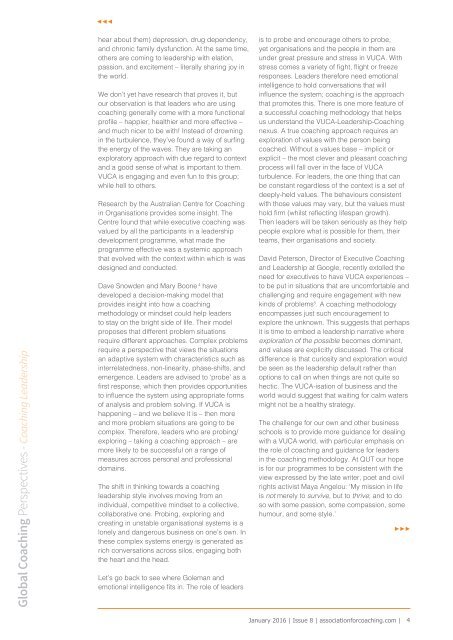Global Coaching Perspectives
bcth8
bcth8
You also want an ePaper? Increase the reach of your titles
YUMPU automatically turns print PDFs into web optimized ePapers that Google loves.
<strong>Global</strong> <strong>Coaching</strong> <strong>Perspectives</strong> - <strong>Coaching</strong> Leadership<br />
hear about them) depression, drug dependency,<br />
and chronic family dysfunction. At the same time,<br />
others are coming to leadership with elation,<br />
passion, and excitement – literally sharing joy in<br />
the world.<br />
We don’t yet have research that proves it, but<br />
our observation is that leaders who are using<br />
coaching generally come with a more functional<br />
profile – happier, healthier and more effective –<br />
and much nicer to be with! Instead of drowning<br />
in the turbulence, they’ve found a way of surfing<br />
the energy of the waves. They are taking an<br />
exploratory approach with due regard to context<br />
and a good sense of what is important to them.<br />
VUCA is engaging and even fun to this group;<br />
while hell to others.<br />
Research by the Australian Centre for <strong>Coaching</strong><br />
in Organisations provides some insight. The<br />
Centre found that while executive coaching was<br />
valued by all the participants in a leadership<br />
development programme, what made the<br />
programme effective was a systemic approach<br />
that evolved with the context within which is was<br />
designed and conducted.<br />
Dave Snowden and Mary Boone 4 have<br />
developed a decision-making model that<br />
provides insight into how a coaching<br />
methodology or mindset could help leaders<br />
to stay on the bright side of life. Their model<br />
proposes that different problem situations<br />
require different approaches. Complex problems<br />
require a perspective that views the situations<br />
an adaptive system with characteristics such as<br />
interrelatedness, non-linearity, phase-shifts, and<br />
emergence. Leaders are advised to ‘probe’ as a<br />
first response, which then provides opportunities<br />
to influence the system using appropriate forms<br />
of analysis and problem solving. If VUCA is<br />
happening – and we believe it is – then more<br />
and more problem situations are going to be<br />
complex. Therefore, leaders who are probing/<br />
exploring – taking a coaching approach – are<br />
more likely to be successful on a range of<br />
measures across personal and professional<br />
domains.<br />
The shift in thinking towards a coaching<br />
leadership style involves moving from an<br />
individual, competitive mindset to a collective,<br />
collaborative one. Probing, exploring and<br />
creating in unstable organisational systems is a<br />
lonely and dangerous business on one’s own. In<br />
these complex systems energy is generated as<br />
rich conversations across silos, engaging both<br />
the heart and the head.<br />
Let’s go back to see where Goleman and<br />
emotional intelligence fits in. The role of leaders<br />
is to probe and encourage others to probe,<br />
yet organisations and the people in them are<br />
under great pressure and stress in VUCA. With<br />
stress comes a variety of fight, flight or freeze<br />
responses. Leaders therefore need emotional<br />
intelligence to hold conversations that will<br />
influence the system; coaching is the approach<br />
that promotes this. There is one more feature of<br />
a successful coaching methodology that helps<br />
us understand the VUCA-Leadership-<strong>Coaching</strong><br />
nexus. A true coaching approach requires an<br />
exploration of values with the person being<br />
coached. Without a values base – implicit or<br />
explicit – the most clever and pleasant coaching<br />
process will fall over in the face of VUCA<br />
turbulence. For leaders, the one thing that can<br />
be constant regardless of the context is a set of<br />
deeply-held values. The behaviours consistent<br />
with those values may vary, but the values must<br />
hold firm (whilst reflecting lifespan growth).<br />
Then leaders will be taken seriously as they help<br />
people explore what is possible for them, their<br />
teams, their organisations and society.<br />
David Peterson, Director of Executive <strong>Coaching</strong><br />
and Leadership at Google, recently extolled the<br />
need for executives to have VUCA experiences –<br />
to be put in situations that are uncomfortable and<br />
challenging and require engagement with new<br />
kinds of problems 5 . A coaching methodology<br />
encompasses just such encouragement to<br />
explore the unknown. This suggests that perhaps<br />
it is time to embed a leadership narrative where<br />
exploration of the possible becomes dominant,<br />
and values are explicitly discussed. The critical<br />
difference is that curiosity and exploration would<br />
be seen as the leadership default rather than<br />
options to call on when things are not quite so<br />
hectic. The VUCA-isation of business and the<br />
world would suggest that waiting for calm waters<br />
might not be a healthy strategy.<br />
The challenge for our own and other business<br />
schools is to provide more guidance for dealing<br />
with a VUCA world, with particular emphasis on<br />
the role of coaching and guidance for leaders<br />
in the coaching methodology. At QUT our hope<br />
is for our programmes to be consistent with the<br />
view expressed by the late writer, poet and civil<br />
rights activist Maya Angelou: ‘My mission in life<br />
is not merely to survive, but to thrive; and to do<br />
so with some passion, some compassion, some<br />
humour, and some style.’<br />
January 2016 | Issue 8 | associationforcoaching.com | 4


